As a writer, I’m very aware of how the words that we use not only describe our world, but also shape how we think about it. When writing about my hens, I could characterize their clucking as chattering or squabbling. One word makes them appear charming, the other, quarrelsome.
We do the same with our horses. What’s the first thing that comes to mind when you tell a friend who has dogs, but no experience with equines, what it’s like to train a horse? Do you say, it’s a prey animal that relies on flight?
If so, then the image that you’ve conveyed is of a fearful animal that is ready to bolt at any moment. Of an animal that needs to be restrained.
I think that the whole “the horse is a flight animal” paradigm is overblown. Yes, they run off to safety, but that’s a small part of the story.
A horse that feels secure is curious, and will even move towards the unknown.
The other night I was at the barn. It was peaceful and quiet. Then, all of the horses went on alert. They didn’t suddenly panic and run into their stalls. They stood, assessing the situation. Ears, eyes, nostrils, taking in information.
One horse walked towards what was startling them.
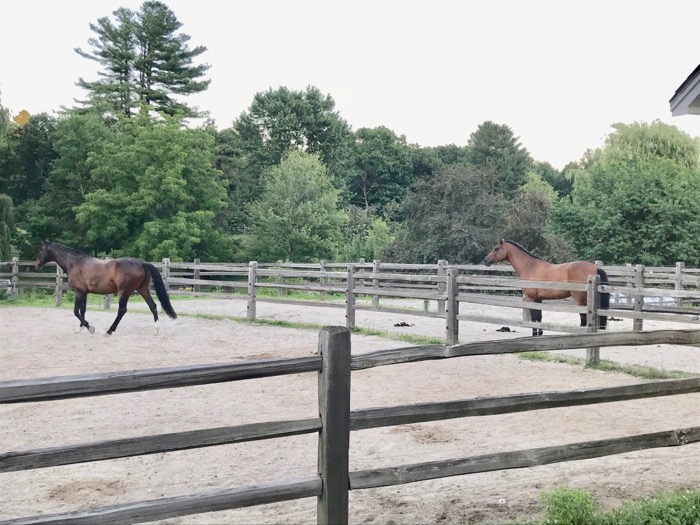
The others joined him.
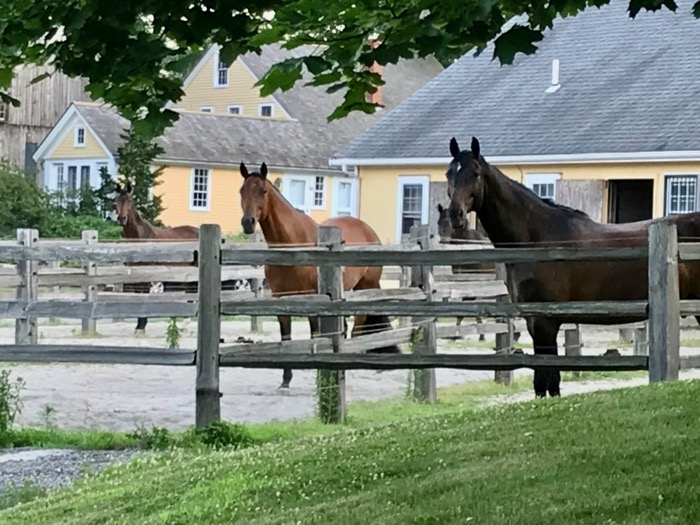
It took me awhile to see what they were orienting to. A deer emerged from the trees. It’s likely that they’ve seen her before and recognize this individual.
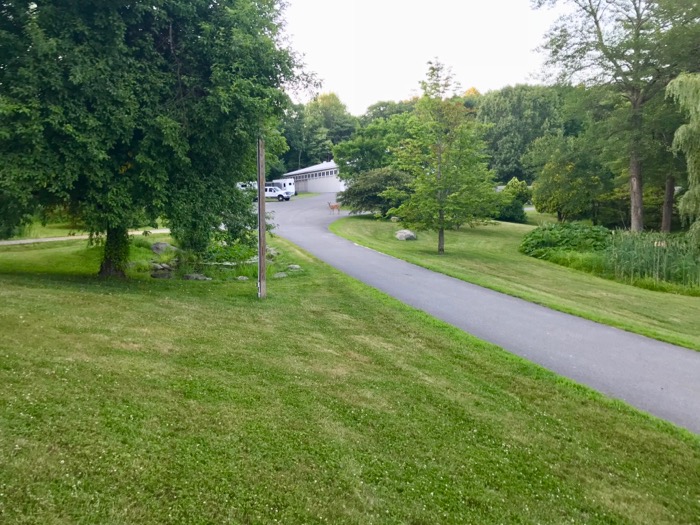
What’s important about this story is that the horses saw a potential threat, and didn’t turn tail and run. They took the time and thought to identify it. They communicated with each other, agreed that Oh, it’s just her, and went back to their hay piles.
Sure, if faced with danger, they’d rather run than fight, and it’s something to be aware of, especially when sitting on a horse’s back. But, they’d much rather not take off in a panic. They’d prefer to ask a friend (you?) if what’s scary is truly a danger, and if not, to get back to the important stuff, like peacefully eating grass in the sun.
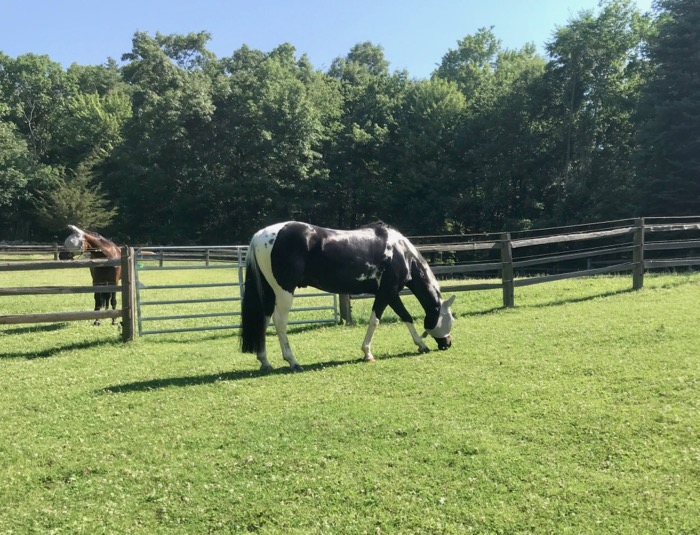
So, how to describe a horse to your dog training friend? I haven’t come up with something as easy to say – and with all of the associated connotations – as “prey animal.” Horses are loyal friends who form close attachments with their herd mates and other species (hopefully us humans!) They are alert, curious, powerful, able to run (fast!), but also capable of both staying put, and being defensive (with some serious weaponry of hooves and teeth.) How to condense that into a word or two that can counter the “flight animal” stereotype? Any suggestions?
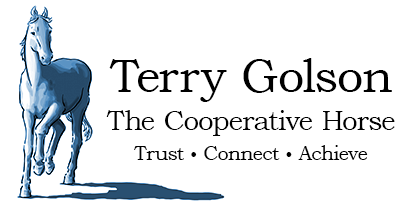

Sentinels, maybe? 🙂 Certain animals make me think of that, horses and deer among them. They’re strong, cautious, alert, etc. – like you said, flight is just one component. We live in a bowl-shaped wooded creek ravine with deer and have observed the variations of “prey animal” behavior. Horses and deer are so magnificent when they run! The deer bed down in the afternoon, browse, bed some more, then get frisky as evening approaches and chase each other in play. The grace and speed with which they traverse the entire curve of the ravine and its many bushes and fallen logs takes my breath away.
I do like the term sentinel. I used to call Tonka the “rooster horse.” Similar idea. He was one of 6 horses in 3 paddocks. He was the first to alert the group to anything out of the ordinary. Then he was the one that they looked at to decide if the danger was past. If Tonka relaxed, so did the others.
Well-armed social grazer / browsers that are like highly athletic, emotionally mirroring toddlers is probably too big a mouthful. For learning to be as safe as possible in managing horses, understanding that they have a proportionately huge amygdala has been helpful for me, but deer have those responses too and can’t e.g. attack an alligator and send the alligator packing the way a horse can. I would be surprised if deer could learn to operate stall latches as well. Interestingly to me, with July 4th just past, horses don’t seem naturally worse than dogs as regards loud noises, so while ds/ cc is important for both it may not be a bigger need for horses.
That is a mouthful 🙂 Horses do get desensitized to loud noises, including gunfire. But they also understand things in context and location.
Personally, I prefer to keep the prey animal wording. The reason I think it is important is because so many horses have lost their natural flight responses due the “restraint” devices (using your term): bits, martingales, training philosophies. I think non-horse people deserve to be educated in what a horse is truly like, and learn how much time and trust it takes to overcome that natural flight response, without using flooding (poor desensitization techniques) or harsh equipment.
The fact is, they are large animals who may flee suddenly if startled. I also explain that this sensitivity means they are highly responsive to subtle cues (no heavy ones needed), very smart, and very athletic in variations of breeding and type. My two cents 😉
Jane, thank you for your comment, it gives me a chance to elaborate 🙂 I haven’t met anyone in the traditional horse world, not even beginners, who haven’t heard of, and bought into the prey animal, flight as a first reaction, trope. Because this is what they see as the basic and most important nature of the animal, they’ve been taught to do all of those things that you mention – especially harsh handling until the horse gives up. I absolutely agree that horses do resort to flight when scared, but I don’t want that to be the one thing that defines these animals. Also, and what I didn’t put in the post (I do try to keep it shorter than a chapter!) is that this trope includes the idea that a prey animal has a predator to worry about, and people are told that since we humans are carnivores, that horses see us as predators, and so horses are therefore innately afraid of us, and so need to be handled in a way (usually dominance-based) to counter their instincts. I think that although horses do worry about predators, that they don’t put humans in that category (unless we give them reason to.)
So, we both agree that the nature of the horse is to flee when they find it necessary. I just don’t want their nature to be distilled to that one descriptive point, which was the point of my blog 🙂
Point taken, Terry! As a former Pony Club instructor, I always try to keep people and horses safe so educating about the realities is important to me. But I see the direction you are coming from as well. I just lean toward encouraging behavior that doesn’t frighten horses in the first place!
I’ve always said horses are part dog (friendly, loyal, playful, social), part cat (think of the irritated mare swishing her tail and giving you the side-eye), part bird (I guess this is the flight animal part lol).
They are an interesting mix of qualities that we see in other animals that we’re close to. But, of course, we’re all related in many physical and cultural ways 🙂